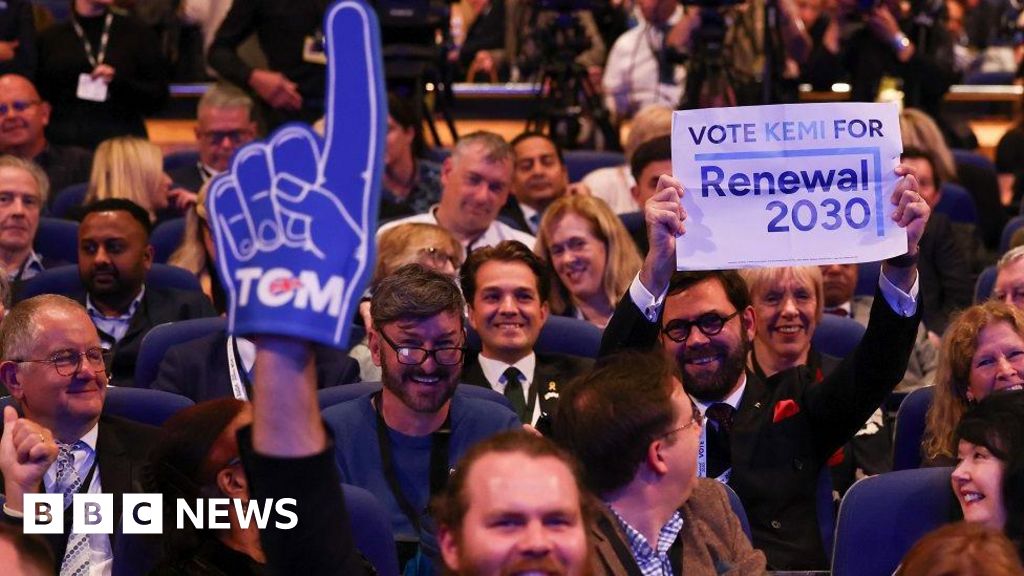Tory leadership race: Seven things you might have missed - 5 minutes read

Tory leadership race: Seven things you might have missed
Nearly four months after the Conservatives went down to their worst defeat in a general election in their history, they have chosen a new leader.
Kemi Badenoch has been unveiled as the winner of the party's leadership contest.
Here is a look back at some highlights - and low moments - in the campaign.
Non-runners
Several big figures in the party never made it to the starting line.
The Tories were reduced to 121 MPs in the general election - losing more than 240 seats including those held by 12 cabinet ministers.
Just like Michael Portillo in 1997, Penny Mordaunt, Grant Shapps and Gillian Keegan lost any hope of leading the party, this time at least, overnight as they were ejected from Parliament by the electorate.
Among those who hung on, former Home Secretary Suella Braverman - regarded for some time as the standard bearer of the right - decided not to run and endorsed former immigration minister Jenrick, her one-time junior at the Home Office, instead.
Melmentum
Mel Stride almost lost his Central Devon seat on 4 July - but clung on by 61 votes.
Despite having the lowest profile of any of the six candidates in the leadership race, he had cultivated a reputation for having a safe-ish pair of hands during his many appearances in media interviews during the general election.
It was a brand the former work and pensions secretary was keen to burnish, pitching himself as the unity candidate who could restore trust in the party.
In the opening ballot of Tory MPs, he outpolled former Home Secretary Dame Priti Patel.
But any sense of "Melmentum" then stalled and Stride was knocked out before the roadshow moved on from Westminster to Birmingham.
Merch wars
He would later be the next contender to be eliminated, but there can be no question that former soldier - he mentioned it once or twice - Tom Tugendhat won the "merch wars" at the party conference in Birmingham, hands down (and sometimes up).
Fun merch is a staple of all parties' annual gatherings as activists meet to chew over the year's highs and lows.
In Birmingham, Jenrick's "We Want Bobby J" baseball caps deserve an honourable mention.
But Team Tugendhat led the field with souvenir hats, t-shirts, mints with his name on them, tattoos - and even Tugend-tan, fake tan.
Maternity pay
No stranger to controversy, and usually not someone to shy away from it, Badenoch was determined to shut down a row over an interview she gave at conference, in which she suggested maternity pay had "gone too far".
She later told reporters she did not think maternity pay "needs changing at all", and insisted her comments had been "misrepresented" because she was talking about cutting regulations on business.
But not before her leadership rivals had seized upon her initial remarks.
Later, at a fringe meeting at conference, Badenoch quipped that some civil servants were so bad, they should be in prison.
But this time there was no distancing herself from the remark. It was an off-the-cuff joke and she embraces being outspoken.
Special forces claim
There were few "blue-on-blue" clashes during the campaign.
Bob Blackman, the chairman of the backbench 1922 Committee running it, warned candidates he would issue yellow cards to any candidate who publicly attacked a rival.
But there was real fury when Jenrick claimed that British special forces were “killing rather than capturing terrorists”, because of the constraints of human rights laws.
Tugendhat, who along with James Cleverly has served in the military, said he was "angry" at a "very serious accusation" which showed "a fundamental lack of awareness of military operations, the command chain, and the nature of the law in the armed forces".
“Our military do not murder people," Cleverly agreed.
Jenrick stood by his claim.
Cleverly's shock exit
They're all smiling, but only two of them are waving to their supporters. And those are the two that would be eliminated days later by their MP colleagues.
It was James Cleverly's exit from the contest that was the most surprising.
Most party members seemed to agree that he won the battle of the speeches that dominated the final day of the conference in Birmingham, telling the party faithful they needed to be "more normal" and offer Conservatism "with a smile".
He then established a clear lead in Tory MPs' penultimate ballot - only to be dramatically eliminated 24 hours later when they voted again: Badenoch 42, Jenrick 41, Cleverly 37.
There were gasps in the Commons committee room where the result was announced.
So what happened? Tory MPs have sometimes been said by some on their own side to be the "most duplicitous" of electorates.
Multiple theories were advanced. But it was a secret ballot, so the truth will never be known.
The debate that never was
Unlike previous Conservative leadership contests, there was no TV debate between the candidates this time.
Badenoch and Jenrick took part in a two-hour special on GB News, but did not engage with each other. They appeared separately to answer questions from Tory members and viewers at home.
Plans for a BBC Question Time special and an event hosted by The Sun never materialised.
Over the campaign, Jenrick gave more interviews and made more speeches than Badenoch - but she was widely considered the frontrunner with more to lose.
Source: BBC News
Powered by NewsAPI.org